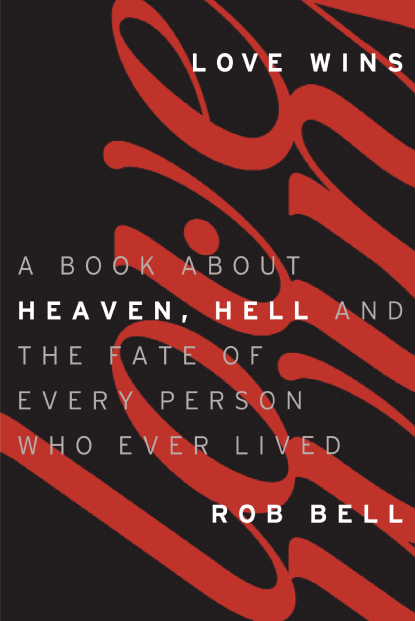Rob Bell is the popular pastor of Mars Hill Bible Church in Grand Rapids, Mich. He is well known for books like “Velvet Elvis: Repainting the Christian Faith,” and the “NOOMA” video series, both of which contain questionable and arguably inaccurate teachings. But now, Bell has caused a firestorm of controversy over his latest book, “Love Wins: A Book about Heaven, Hell, and the Fate of Every Person who Ever Lived.” In it, Bell appears to reject the notion of a hell as eternal punishment and accept a form of universalist theology–– the idea that everyone will eventually be saved).
Since I have not read the book yet, I cannot give a comprehensive analysis. But from what other readers have said, and from Bell’s interviews about the book, I would like to offer a few tentative observations.
Bell dodges questions about universalism
In an interview with Martin Bashir of MSNBC, Bell gave very contradictory and ambiguous answers to questions about his new book. When Bashir asked, “Are you a Universalist who believes that everyone can go to heaven regardless of how they respond to Christ on Earth?” Bell responded, “In regards to the question, ‘Are you a Universalist?’ I would say first and foremost, no. But [universalism] is a perspective within the Christian stream. There has been, within the Christian tradition, a number of people who have said, ‘Given enough time, God will win everybody over.’”
History riddled with heretical Christian theology
I’ve been studying Christian history and traditions for a while, and there are always a few people who argue for different ideas within Christianity –– but this does not mean they are speaking from a biblically-sound perspective. For example, in the fourth century, Arius, a church leader from Alexandria, taught within the “Christian stream” that Jesus was not equally God with the Father. Yet, today we recognize this as heretical theology. Origen was another such early Christian theologian, whose writings reveal universalist thought. However, rather than disclaiming Origen, Bell uses his writings as proof that other people in Christian history had a universalist outlook.
Bell answers evasively
When Bashir asked Bell, “So why do you choose to accept and promote the works of the early writer Origen, and not, for example, Arius, who took a view of Jesus’ deity, as Jesus being not God. Why do you select one and not select the other?” Bell gave a very evasive answer: “Because first and foremost, I’m a pastor. And so I deal with real people in a real world asking and wrestling with these issues of faith. And what I have discovered over and over again is there are people who have questions and hunches… and you can simply give them the gift of ‘By the way, within the Christian tradition, there are scholars and theologians and there are other people who have had the same questions and have had the same theories…’”
Bell merely evaded the issue and did not address his double standard of using Origen’s theology to justify his book’s universalist leanings, while rejecting Arianism. Logically and theologically, Bell’s arguments simply don’t hold up.
Amazon reviewers make good observations
Among the many people who have already read Rob’s book, Mark A. Almlie, a Fuller Theological Seminary M.Div graduate, pointed out in an Amazon review: “In Matthew 25, Jesus the judge separates the sheep from the goats and sends the goats to ‘eternal punishment.’ Only, this doesn’t fit with Bell’s theology, so he simply translates the phrase differently. He says ‘eternal punishment’ should be translated as ‘a period of pruning’ or a ‘time of trimming!’” That’s interesting. But since the Greek word in question, aionion, is being used in the same immediate context for both eternal life and eternal punishment, it seems highly unlikely that one can be translated “time of trimming” while the other is translated “eternal life.” There is no valid linguistic or hermeneutical reason for one “eternal” to be temporal while the other truly everlasting.
Bell stirring questions about nature of hell
On the issue of hell, another Amazon reviewer, Fr. Charles Erlandson, argued that Bell’s view is clearly unbiblical: “Rob directly contradicts the clear teaching of the Bible… Rob says without hesitation that he believes in a literal hell, but the hell he has in mind is the hell of the Rwandan genocide: in other words, a completely earthly hell… it’s not about eternal punishment at all.”
But, the story of the rich man and Lazarus in Luke 16 alone refutes the idea that hell is on earth, since the rich man lifted up his eyes “in hell” after he had died on earth and his spirit left his body. So, from this, it seems that Bell has gone off the deep end and fallen clearly into heresy. Love did win at Calvary, but not the way Bell appears to argue. I look forward to seeing for myself after reading the book.







